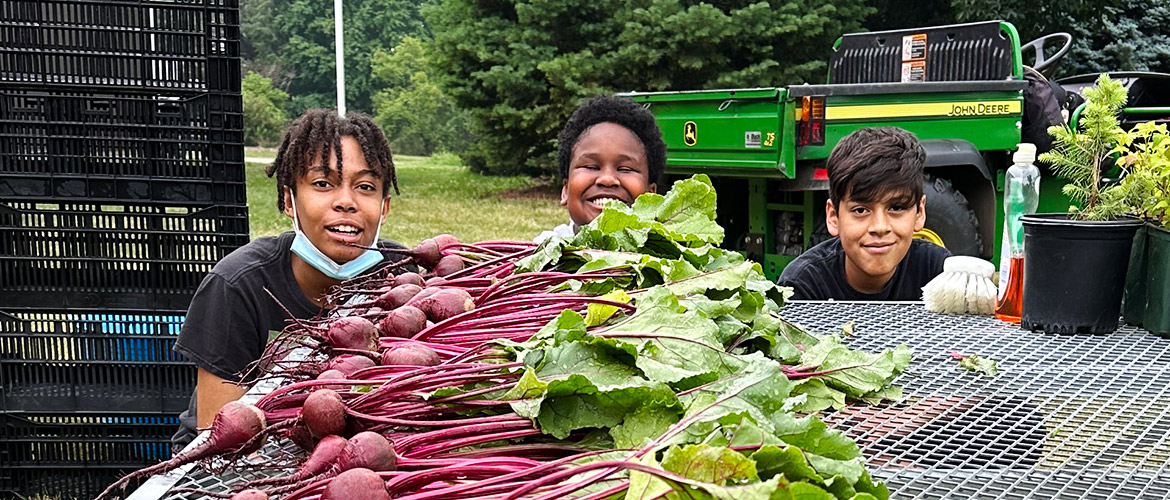Newsroom | Community Health

Combating Food Insecurity Through Sustainable Farming
The College of Lake County Foundation is ramping up efforts to address food insecurity in parts of the county and reduce health care disparities with its Green Youth Farm initiative.
Life expectancy for Waukegan residents is 15 years shorter than it is for people living just five miles south in Lake Forest, according to a report from Lake County nonprofit Brushwood Center. Social and economic factors, including poor food quality and availability, contribute to that disparity.
This summer, CLC’s Lakeshore campus in Waukegan partnered with the Lake County Forest Preserve District to secure a one-acre plot of land for the college’s Green Youth Farm initiative. The farm utilizes sustainable agriculture techniques with almost zero emissions and provides paid work experience to local high school students interested in careers in agriculture, sustainability and natural resources at CLC.
With help from a $50,000 Blue Impact℠ grant from BCBSIL, the Green Youth Farm initiative this season employed five high school students from Waukegan and North Chicago for six months and produced 7,000 pounds of fresh food. Next season, their goal is to hire 20 students and produce up to 20,000 pounds of food for Lake County residents.
“We like to think of the Green Youth Farm as the first step toward career pathways and opportunities in higher education, culinary, horticulture, and health and wellness at CLC and beyond,” says Urban Farm Director Eliza Fournier. “High school students from Waukegan and North Chicago are introduced to those career opportunities, receive paid work experience and learn healthy lifestyle habits.”
Illinois grows only 4% of the food that it eats and imports 96%, according to a Northern Illinois University report. Fournier, who previously worked as the health and special contracts director for Chicago Botanic Garden’s Windy City Harvest, says they hope to change that.
“Our ultimate goal is to help re-localize the food system in Lake County so we can be more responsive and resilient in times of change,” Fournier says. “We’re hoping to grow the farmers who will grow the food and the distribution networks that will make food available and increase the consumption of healthy food throughout our county.”
The effort is part of CLC’s wider Urban Farm Center project opening at the college’s Lakeshore campus in 2025. The $15 million, 24,000-square-foot farm to table facility will include training and education classes, retail areas for local health food growers and sellers, a hydroponic greenhouse and other sustainable features.
Food is distributed through community donations. Eventually the initiative will move toward weekly farm stands and a pilot produce prescription program.
CLC is working to partner with local food pantries, federally qualified health centers and other local organizations. Supplemental Nutrition Assistance Program (SNAP) and Special Supplemental Nutrition Program for Women, Infants and Children (WIC) recipients will have priority access and will be able to purchase food through the LinkUp Illinois program, which doubles the value of supplemental benefits for purchases at farmers markets, food co-ops and similar sellers across Illinois.
“Our Blue Impact grants support nonprofit organizations committed to improving health equity and access for people in Illinois,” said Katie Cangemi, Senior Program Officer, Community Investment at BCBSIL. “We’re proud to support the Green Youth Farm and the students learning new skills in food production.”
